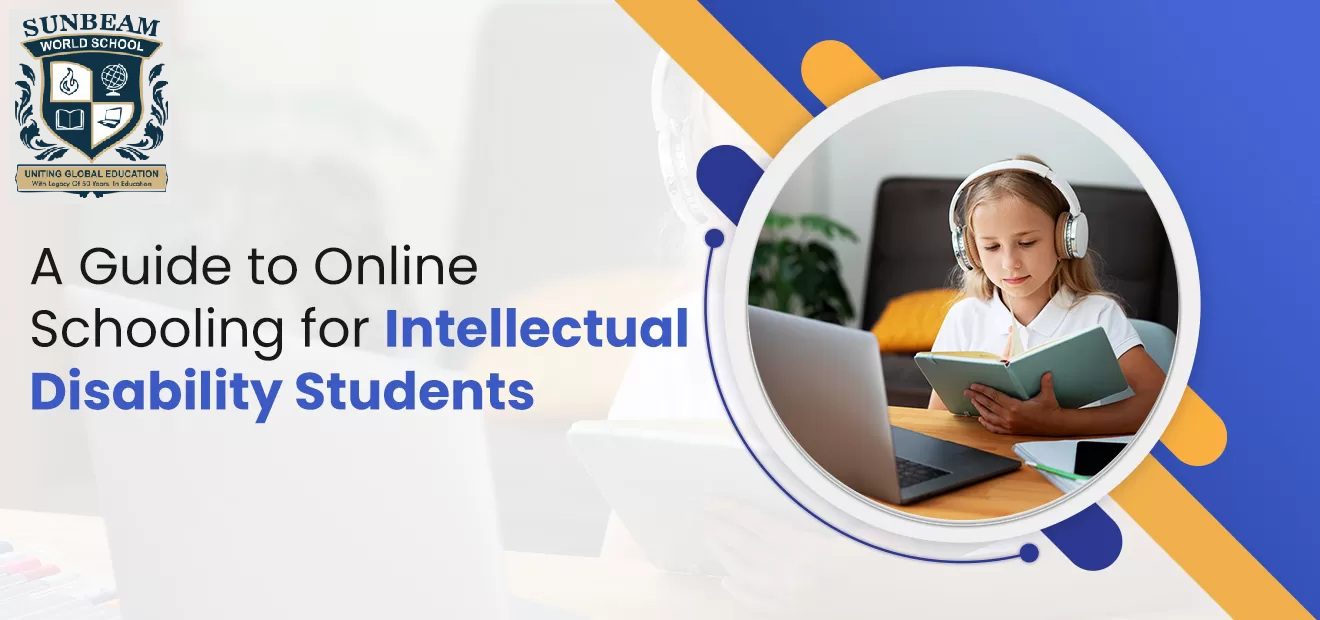In contemporary Indian education, inclusive learning environments have gained well-deserved prominence. This signifies the acknowledgement that every child has the right to a top-tier education, irrespective of their background or learning requirements. For students with intellectual disabilities, however, the standard classroom setting might not always be the most conducive space to foster their academic growth. This is where homeschooling emerges as a compelling alternative, providing a unique opportunity for intellectually disabled students to learn and thrive in a flexible and supportive virtual environment.
Also Read:How Online School Promotes Inclusivity?!
Intellectual Disabilities and Special Needs
Intellectual disability is a general term encompassing a range of cognitive limitations that affect a child’s ability to learn and process information. These limitations can manifest in various ways, including:
Difficulties with Communication
Children with intellectual disabilities may experience challenges expressing themselves verbally and comprehending complex language. This can manifest in limited vocabulary, difficulty forming sentences, or struggles with clear pronunciation. Understanding figurative language, sarcasm, or fast-paced speech can also be an obstacle. These communication difficulties can lead to frustration and hinder a child’s ability to participate in classroom activities or social interactions.
Challenges with Problem-Solving and Critical Thinking
Abstract concepts, like metaphors or scientific theories, can be difficult for children with intellectual disabilities to grasp. Applying these concepts to solve problems in areas like math or science can be an additional hurdle. Breaking down difficult tasks into smaller and manageable steps and utilising visual aids can be helpful strategies. However, critical thinking skills, like analysing cause-and-effect relationships or evaluating different solutions, may require additional support to develop fully.
Academic Skill Deficiencies
The pace of acquiring foundational academic skills, such as reading, writing, and math, may be slower for children with intellectual disabilities. This can be due to difficulties processing information, memory retention, or motor skills needed for writing. Traditional classroom instruction might need to be tailored to their learning pace. However, these students can achieve academic progress with targeted interventions and a focus on building strong foundational skills.
Social and Emotional Development Delays
Social interaction and emotional regulation can be areas where children with intellectual disabilities require extra support. Understanding social cues, navigating social hierarchies, or expressing emotions constructively can be challenging. These difficulties can lead to social isolation or frustration. With smaller class sizes and potentially more structured social interaction opportunities, online schooling platforms can provide a safe space for these students to develop social skills at their own pace. Additionally, social-emotional learning programs can equip them with strategies for emotional regulation and building positive relationships.
It’s crucial to remember that intellectual disability is a spectrum, and every child’s needs will be unique. A comprehensive evaluation by a qualified professional can help determine the specific areas where a child requires additional support.
Also Read: How Online School Promotes Inclusivity?!
Understanding Your Child’s Needs
Navigating the educational landscape can feel overwhelming for a parent of a child with an intellectual disability. The first and most important step is collaborating with specialists, including teachers, therapists, and psychologists, to create a personalised learning plan. This plan should outline your child’s strengths, weaknesses, and preferred learning styles.
Here are some key considerations when understanding your child’s educational needs:
Learning Style
Every child learns differently, and this is especially true for special needs students with intellectual disabilities. Identifying your child’s preferred learning style is crucial for maximising academic success. Visual learners benefit from clear visuals, graphic organisers, and pictures to grasp information. Conversely, kinesthetic learners thrive through hands-on activities, movement breaks, and practical applications of concepts. Auditory learners learn best by listening to audiobooks, participating in discussions, or receiving clear verbal instructions. Online home schools can cater to these diverse learning styles by offering a range of learning materials and interactive elements.
Attention Span
Students with intellectual disabilities may have shorter attention spans compared to their peers. Traditional classroom lectures can become overwhelming, leading to decreased focus and difficulty retaining information. Virtual schooling platforms address this by offering bite-sized learning modules. These shorter, focused lessons allow students to absorb the material in manageable chunks. Additionally, the flexibility of online learning allows for scheduled breaks to refocus and regain energy. This adaptability caters to individual attention spans and promotes a more effective learning experience.
Motivation and Engagement
Keeping a child with intellectual disabilities engaged in learning is essential for fostering a love of learning and promoting academic progress. Gamification, a technique that incorporates game-like elements into learning activities, can be a powerful tool for motivation. Online schools may offer interactive exercises, point systems, or badges that create a sense of accomplishment and encourage continued learning. Interactive elements like quizzes, polls, and collaborative projects can also boost engagement by providing opportunities for active participation. Furthermore, strong student-teacher interaction is crucial. Qualified special education schools and teachers can personalise instruction and provide immediate feedback, keeping students motivated and on track.
Also Read: How Online School Can Help Chronically Ill Children Thrive
Choosing the Right Curriculum and Teaching Methods
The curriculum chosen for your child should align with their individual learning goals and abilities. The CBSE-aligned curriculum, offered by Sunbeam World School, provides a strong foundation in core subjects like math, science, English, Hindi, and social studies. However, it’s important to choose an online school that can supplement this curriculum with additional support and resources specifically designed for students with intellectual disabilities.
Here are some factors to consider when evaluating the curriculum and teaching methods offered by an online school:
- Individualised Education Program (IEP) Development: Does the school offer support in developing an IEP tailored to your child’s unique needs?
- Qualified Special Education Teachers: Are there experienced special education teachers on staff who can provide differentiated instruction and support?
- Assistive Technologies: Does the school leverage assistive technologies like screen readers or text-to-speech software to aid learning?
- Social-emotional Learning Programs: Does the online school integrate social-emotional learning programs to help students develop essential life skills?
Also Read: How Online Schools Empower Children with Disabilities to Rise?!
Sunbeam World School: Empowering Students with Intellectual Disabilities
Sunbeam World School recognises the unique needs of students with intellectual disabilities and offers a supportive and inclusive online learning environment. With a CBSE-aligned curriculum and a commitment to differentiated instruction, Sunbeam empowers these students to reach their full potential.
Here’s how Sunbeam World School can support your child’s educational journey:
- Individualised Attention: Small class sizes and qualified special education teachers ensure that each student receives the personalised attention they deserve.
- Flexible Learning Pace: The online platform allows kids to study at their own pace, revisiting concepts as required and mastering them before moving on.
- Multi-sensory Learning: Sunbeam incorporates various teaching methods, including visual aids, interactive activities, and hands-on projects, to accommodate different learning styles.
- Social-emotional Learning: The school integrates social-emotional learning programs to equip students with the skills they need to navigate social interactions and build positive relationships.
Also Read: Sunbeam World School Concept of Inclusive Homeschooling
Trust Sunbeam World School for Quality Education
The decision to choose an online school for your child with an intellectual disability is a significant one. By prioritising your child’s specific needs, seeking professional guidance, and researching online schools with strong special education courses, you can empower them to thrive in a supportive virtual learning environment. Sunbeam World School is committed to inclusivity, has qualified educators, and has a curriculum designed for diverse learners, which stands out as a compelling choice. The school’s online platform offers the flexibility and personalised attention that can significantly benefit students with intellectual disabilities.
Schedule a free consultation today to learn more about how Sunbeam World School can support your child’s educational journey. Call us at 9711256925. Sunbeam World School believes in unlocking the potential within every child, and we are here to partner with you to foster your child’s academic and personal growth.








